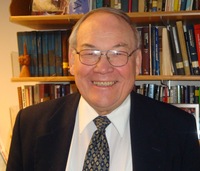 Vernon Weckwerth completed his undergraduate and graduate work at the University of Minnesota. Weckwerth returned to the University of Minnesota as a summer program administrator and lecturer. He became a professor of hospital administration in the School of Public Health in 1964. During his tenure, he began the Independent Study Program, tailored as an executive training program particularly for rural administrators. In that same year, Weckwerth became a coordinator for the Office of Continuing Hospital and Health Care Education. In 1969, he also became a professor in the Department of Family Practice, which he launched. He formally retired in 2009, but continues to do work with the University.
Vernon Weckwerth completed his undergraduate and graduate work at the University of Minnesota. Weckwerth returned to the University of Minnesota as a summer program administrator and lecturer. He became a professor of hospital administration in the School of Public Health in 1964. During his tenure, he began the Independent Study Program, tailored as an executive training program particularly for rural administrators. In that same year, Weckwerth became a coordinator for the Office of Continuing Hospital and Health Care Education. In 1969, he also became a professor in the Department of Family Practice, which he launched. He formally retired in 2009, but continues to do work with the University.
Interview Abstract
Vernon Weckwerth begins his interview by discussing his upbringing during the Great Depression near the Red River Valley of Minnesota, his early education, and the rather circuitous route he took to the University of Minnesota. He discusses his graduate education, his return to Minnesota, and his professorship in health care administration in the School of Public Health. Weckwerth highlights some of his work in hospital administration within the context of the University’s land-grant mission and the creation of the Independent Study Program (ISP) to serve rural populations. As he relates his creation of ISP, Weckwerth elaborates on his educational philosophy and town/gown issues. Though his degrees were not in public health, Weckwerth took all of the public health courses offered by the University. He relates his interest in public health in terms of his rural upbringing and how he entered the field professionally. He then discusses the leadership of Gaylord Anderson, Lee Stauffer, and Edith Leyasmeyer in the School of Public Health. He also covers the following: his interpretation of dean appointments, his philosophy of public health as a field, the relationship of the School of Public Health to other departments, biostatistics, his role in the national heart study, the creation of the family practice program, the reorganization of the AHC, his experiences with the state legislature and community and professional organizations, his role in creating a doctoral program in nursing, the spread and closing of ISP, and his time on the faculty senate.
Biographical Sketch
Vernon Weckwerth was born in northwestern Minnesota near the Red River Valley in 1931. Though his family moved to Colorado for several years, they moved back to Minnesota when Weckwerth approached adolescence. He was raised in a rural area during the Great Depression and attended a one-room country school, which profoundly shaped his views of education. Initially lacking the means to attend college, Weckwerth went to work. When he couldn’t purchase a parts dealership in his hometown because of his age, he decided to attend the University of Minnesota. He earned his B.S. in 1954 in Mathematics and Education while in the Air Force ROTC. He earned his M.S. in 1956 in Biostatistics and Mathematics, and his Ph.D. in 1963 in Biostatistics and Public Health. While working on his Ph.D., from 1958 to 1959, Weckwerth taught Biostatistics in the School of Public Health and also worked in Chicago as the head of the Department of Research and Statistics of the AHA and as Assistant Director of Hospital Research and the Educational Trust. Weckwerth returned to the University of Minnesota as a summer program administrator and lecturer. Because of his experiences in Chicago, he became a professor of hospital administration in the School of Public Health in 1964. During his tenure, he began the Independent Study Program, tailored as an executive training program particularly for rural administrators. In that same year, Weckwerth became a coordinator for the Office of Continuing Hospital and Health Care Education. In 1969, he also became a professor in the Department of Family Practice, which he launched. He formally retired in 2009, but continues to do work with the University.
Interview Transcript
VWeckwerth.pdf